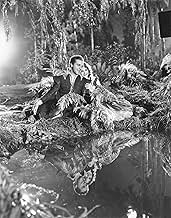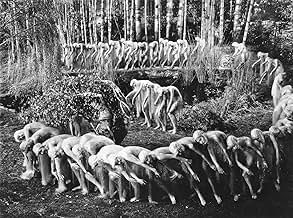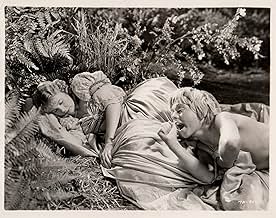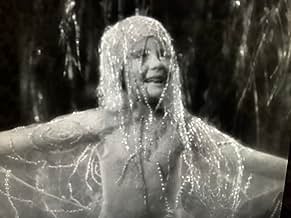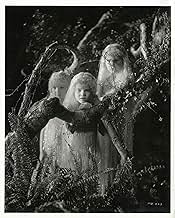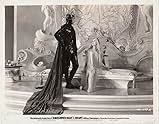IMDb RATING
6.8/10
4.1K
YOUR RATING
Two couples and a troupe of actors have an encounter with some mischievous fairies in the forest.Two couples and a troupe of actors have an encounter with some mischievous fairies in the forest.Two couples and a troupe of actors have an encounter with some mischievous fairies in the forest.
- Directors
- Writers
- Stars
- Won 2 Oscars
- 6 wins & 2 nominations total
Olivia de Havilland
- Hermia - In Love with Lysander
- (as Olivia de Haviland)
Nini Theilade
- Fairie - Attending Titania
- (as Nina Theilade)
- Directors
- Writers
- All cast & crew
- Production, box office & more at IMDbPro
Featured reviews
Though another commentator disagrees, if Rooney is not the greatest Puck you've ever seen, then tell me who is. With all respect to a talented actor, the sad part is that he played his greatest role when he was, what, 14?
The greatest Shakespeare movie of all time, in my opinion. The dazzling cinematography for its age. The fact that they got the mostly American actors to speak the lines properly. That inspired scene with a fairy jazz band. The special "star spangled" effect.
The criticism that scenes are overly long is related to a more modern perception of how long a scene should be, and alas, Shakespeare is mostly unmercifully cut (look at Olivier's last "King Lear"--Branaghs "Hamlet" would be an exception). Shakespeare just wrote long scenes. You woulnd't have Juliet on the balcony just say "I love you, Romeo," and disappear.
The greatest Shakespeare movie of all time, in my opinion. The dazzling cinematography for its age. The fact that they got the mostly American actors to speak the lines properly. That inspired scene with a fairy jazz band. The special "star spangled" effect.
The criticism that scenes are overly long is related to a more modern perception of how long a scene should be, and alas, Shakespeare is mostly unmercifully cut (look at Olivier's last "King Lear"--Branaghs "Hamlet" would be an exception). Shakespeare just wrote long scenes. You woulnd't have Juliet on the balcony just say "I love you, Romeo," and disappear.
10artzau
Thalberg's pledge to give back to the people something good is seen in this project realized 66 years ago. Everyone is acting! No one struts or swains, dying to be a star. The young, superlovely Olivia de Havilland is a gorgeous and fun Hermia in her maiden role. Dick Powell and Ross Alexander as the two Athenian youths confused by Puckish Mickey Rooney Robin Goodfellow are wonderful in their entanglement with beautiful Jean Muir's Helena. The players, Frank McHugh, Dewey Robinson, Hugh Herbert, Grant Mitchell and the wonderful snob's snob, Arthur Treacher are topped by Jimmy ("you dirty rat") Cagney [trivia buffs know he never said those lines except in response to Gorshen and Rich Little's impressions of him at a roast before his death] and Joe E. Brown's Flute. Victor Jory, often cast as a villain is great as Oberon, as is lovely Anita Louise as Titania. There's not a weak spot in this cast and the entire play, in living Black and White, is soft, diffused and whispery as a summer night. Erich W. Korngold's music is supplemented by the exquisite Mendelssohn score and look for a tiny Billy Barty as Mustardseed, one of the sprites. There are other fine ones, the RSC's 1968 and the recent 1999 are wonderful, but, fans, take it from an old Shakespeare buff, this one is an immortal production.
I came across this movie one rainy afternoon on TV. Jimmy Cagney doing Shakespeare? Surely not! My expectations were, frankly, low. We English are a bit funny about Shakespeare, as you can imagine, and the thought of the dirty rat as one of the bard's greatest comic creations was worrying, to say the least. The whole film is, however, magical. I laughed out loud at the wall joke, even though I knew what was coming, and Roony's Puck was, as another contributor says, probably his best performance. Bottom's realisation that he is now the proud possessor of an ass's head is quite affecting. It's Titania's fairies, though, that make this such a wonderful experience. I have seen this a couple of times since that rainy afternoon, and am always convinced that it will not live up to my expectations. It always does, though. The sheer beauty of the scene where the fairies awake is, as we say over here, gob-smacking. I am sure that this could never be done with such picturesque quality in colour. I had this on tape for a long time, and then I lent it to some eejit who erased it. I scan the listings every week to see if it's on TV, and when it is I shall make sure that it never leaves my possession.
Early Hollywood wasn't known for its high-brow culture, and this film was an important step in enriching the cinema. The opening titles reveal how proud Warner Brothers were to have done it, and what a production it was indeed: all the top Warner's stars, the best technical support in the world, a top composer of the day in Erich Korngold, ballet choreography by Nijinska, and the highly respected Max Reinhardt as director. You couldn't have asked for more in those energetic movie days.
And, happily, it works! It's still beautiful, exciting, technically enthralling--and very funny! There are too many great performances to single out even one; but as an ensemble, the "players" are marvelous. No one seems stilted; everyone is right at home; even though most of these individuals hadn't been trained to the classical stage--they were just good! and, incidentally, it just goes to show the timelessness of the play itself.
Some scenes today seem overlong, and I think someone should have toned down little Mickey Rooney a good bit, but all in all it's a triumph. Midsummer or not, it's a sweet interlude.
And, happily, it works! It's still beautiful, exciting, technically enthralling--and very funny! There are too many great performances to single out even one; but as an ensemble, the "players" are marvelous. No one seems stilted; everyone is right at home; even though most of these individuals hadn't been trained to the classical stage--they were just good! and, incidentally, it just goes to show the timelessness of the play itself.
Some scenes today seem overlong, and I think someone should have toned down little Mickey Rooney a good bit, but all in all it's a triumph. Midsummer or not, it's a sweet interlude.
Max Reinhardt's theatre production, together with William Dieterle's directorial flair, brings Shakespeare to Hollywood. The ideas and effects within this vision are brilliant, although the detail has undoubtedly diminished with the wear and tear of several decades.
Best in the actors are Mickey Rooney as Puck, and Joe E Brown as Flute. James Cagney is Bottom, Anita Louise is Titania, Victor Jory is Oberon, Olivia de Havilland and Dick Powell are amongst the lovers. All are ok but nothing special. The little changeling is Kenneth Anger, who would later be vitriolic in his book 'Hollywood Babylon'.
Perhaps the best thing about this film is how it looks. It truly is magical, and you get the sense of fairies and sprites causing mischief and confusion deep in the woods. I have the feeling it would look superb in colour.
Best in the actors are Mickey Rooney as Puck, and Joe E Brown as Flute. James Cagney is Bottom, Anita Louise is Titania, Victor Jory is Oberon, Olivia de Havilland and Dick Powell are amongst the lovers. All are ok but nothing special. The little changeling is Kenneth Anger, who would later be vitriolic in his book 'Hollywood Babylon'.
Perhaps the best thing about this film is how it looks. It truly is magical, and you get the sense of fairies and sprites causing mischief and confusion deep in the woods. I have the feeling it would look superb in colour.
Did you know
- TriviaWhen the forest that Max Reinhardt designed could not be lit properly, cinematographer Hal Mohr thinned the trees slightly, sprayed them with aluminum paint and covered them with cobwebs and tiny metal particles to reflect the light. As a result, he became the first (and only) write-in winner of an Academy Award.
- GoofsCorrective lenses were introduced in the 13th century so they could have been worn in Shakespeare's time.
- Quotes
Hermia, in Love with Lysander: [to Helena] How low am I, you painted maypole? Speak! How low am I? I am not yet so low but that my nails can reach into your eyes!
- Crazy creditsThe opening credits appear as if they were "trickling down" from the top of the screen.
- Alternate versionsThe original 132-minute roadshow version of this film has been restored, shown on cable, and issued on videocassette and DVD. For many years, though, this film was shown only in its general release version, a 117-minute version painstakingly edited by the studio (so that the cuts would not be noticeable), which shifted the order of some sequences and eliminated others.The 2007 DVD release also restores the Intermission title card, not seen since the film's original roadshow release in 1935, as well as including the overture and exit music.
- ConnectionsFeatured in A Dream Comes True (1935)
- SoundtracksA Midsummer Night's Dream: Overture and Incidental Music
(1826) (uncredited)
Music by Felix Mendelssohn
Adapted by Erich Wolfgang Korngold
Heard throughout the film
- How long is A Midsummer Night's Dream?Powered by Alexa
Details
- Release date
- Country of origin
- Official site
- Language
- Also known as
- A Midsummer Night's Dream
- Filming locations
- Production companies
- See more company credits at IMDbPro
Box office
- Gross worldwide
- $2,616,000
- Runtime
- 2h 13m(133 min)
- Color
- Sound mix
- Aspect ratio
- 1.37 : 1
Contribute to this page
Suggest an edit or add missing content


